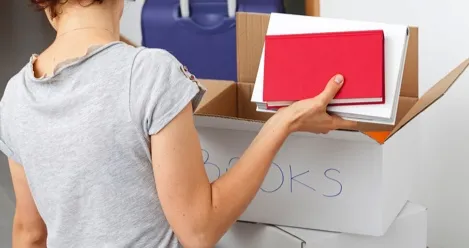
7 Things I Learned From Sorting, Packing, and Storing my Books
Until this month, I’d lived in a 450 square foot studio apartment for six years. It was a great space, it fit my life, and it had more books in it than were probably necessary. It’s not an exaggeration to say that the first reaction I got most often when showing someone my home was, “Wow—you have a lot of books.” I generally didn’t mention that I also had a small storage space in the basement of the building filled with—you guessed it—more books. (Also Christmas decorations, but that’s not really relevant here.)
So when I decided in early 2018 that I’d spend most of 2019 traveling, I knew I’d have to decide what to do with each of those books: give it away, pay to store it, or make space to take it with me. Over the course of a year, I went through every last one of the hundreds of books I owned. Here’s what I learned.


Start Early
In fact, start now. Even if you have no plans to move anytime soon, start sorting your books today. Or at least this week. It takes longer than you think to sort through every book and decide what you want to do with it, and future you will thank you for doing it at your own leisurely pace instead of having to do it when you’re also trying to book movers/arrange a Goodwill pick-up/hang out outside liquor stores so you can take the empty boxes they’re discarding. And speaking of boxes…Box Size Matters
The thing about a box of books is: it’s heavy. It’s filled with all of the blood, sweat, tears, hopes, and dreams of the authors who wrote those books, and all of those things make a box very heavy. Presumably also the paper and stuff also plays a role, but I’m not an expert on physics. Regardless, smaller boxes are far better suited to books than larger boxes if your goal is to move them from one place to another, and you may end up moving them around a lot as you’re packing even just to get them out of the way so you can do other packing. If you run out of small boxes, fill a medium or large size box 1/3 or 1/2 full of books and then add something light—extra pillows, towels, feather boas—on top to fill it up.Clear Boxes Make Things Easier If You Don’t Have X-ray Vision
If it’s an option for you, also consider clear plastic bins for your books, especially if you’re packing them for the long term. If you have a clear box and pack your books with the spines facing out, you’ll be able to find a specific book without unpacking every box in your closet or storage space. Plus, they’re waterproof. I can tell you from personal experience, that makes a real difference if your storage space is not waterproof. One more bonus: if you’re like me, having your book spines or covers visible will also help expose your movers to a variety of inclusive romance titles.Sort Your Books a Second Time
Now that you have the boxes, it’s time to sort your books again. I know, I know: you already went through all of them, got rid of a dozen or so, and you desperately need each and every one of the titles you kept for that day in the future when you finally have a home with a dedicated library. Listen, I’m in no place to tell anyone how many books they should or shouldn’t have. I’ve got more than a dozen boxes of books in storage, and that doesn’t count the 3 boxes taking up space in my car as I’m traveling. But I can tell you that asking myself some key questions helped me get rid of hundreds of books over the last year. Here are a few of them:- Did I forget I owned this book? If so, will not owning it really feel like a loss?
- How will I feel when I unpack this book in ten months? Excited? Ambivalent? Confused as to why I paid to store it with money that could have gone to more books or Dollywood tickets?
- If I’ve had this book for more than ten years (or 15…) and haven’t read it, do I really want to read it? And if I can genuinely imagine myself wanting to read this book most of all someday, would I be doing so in an era in which libraries are likely to exist?



